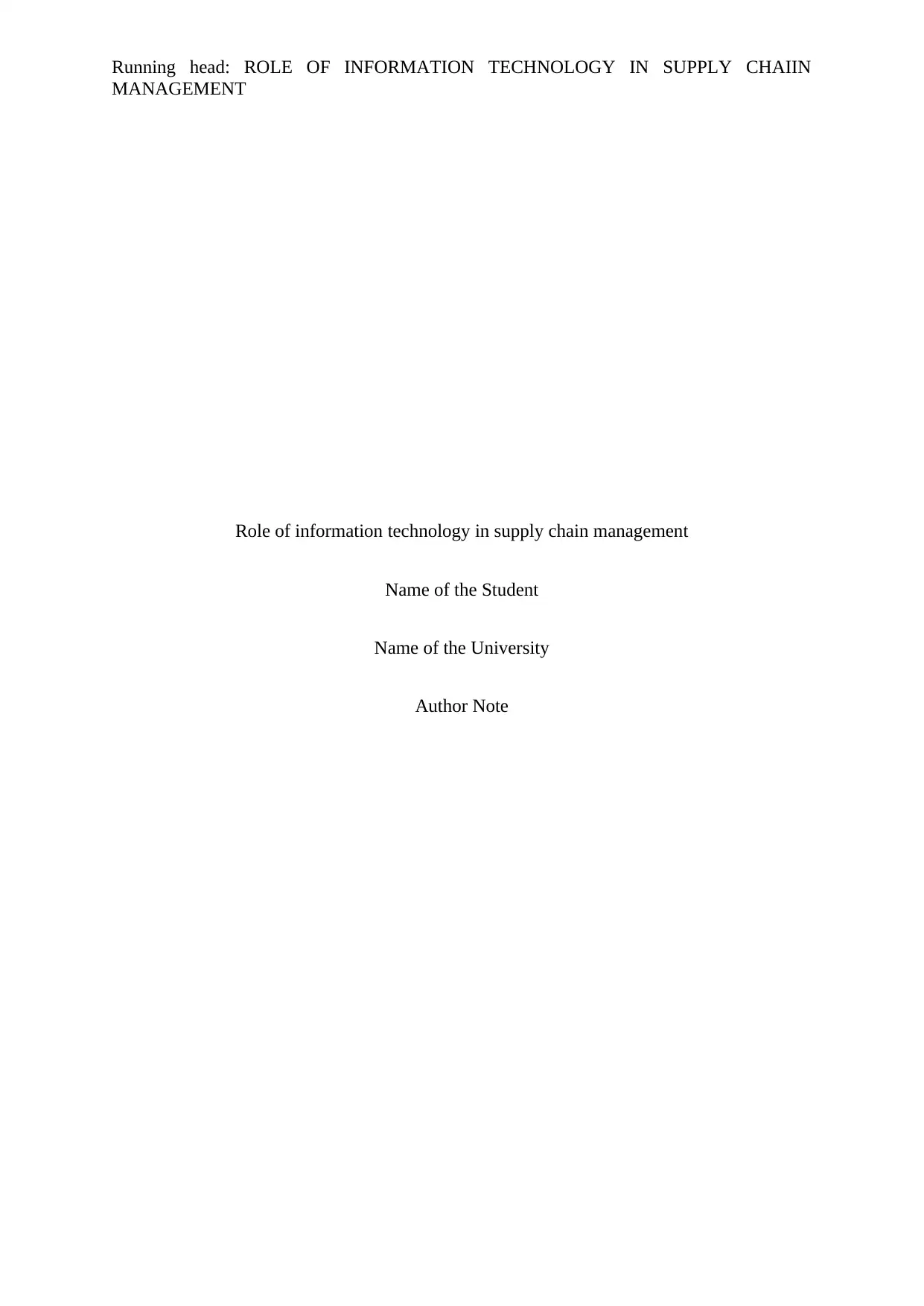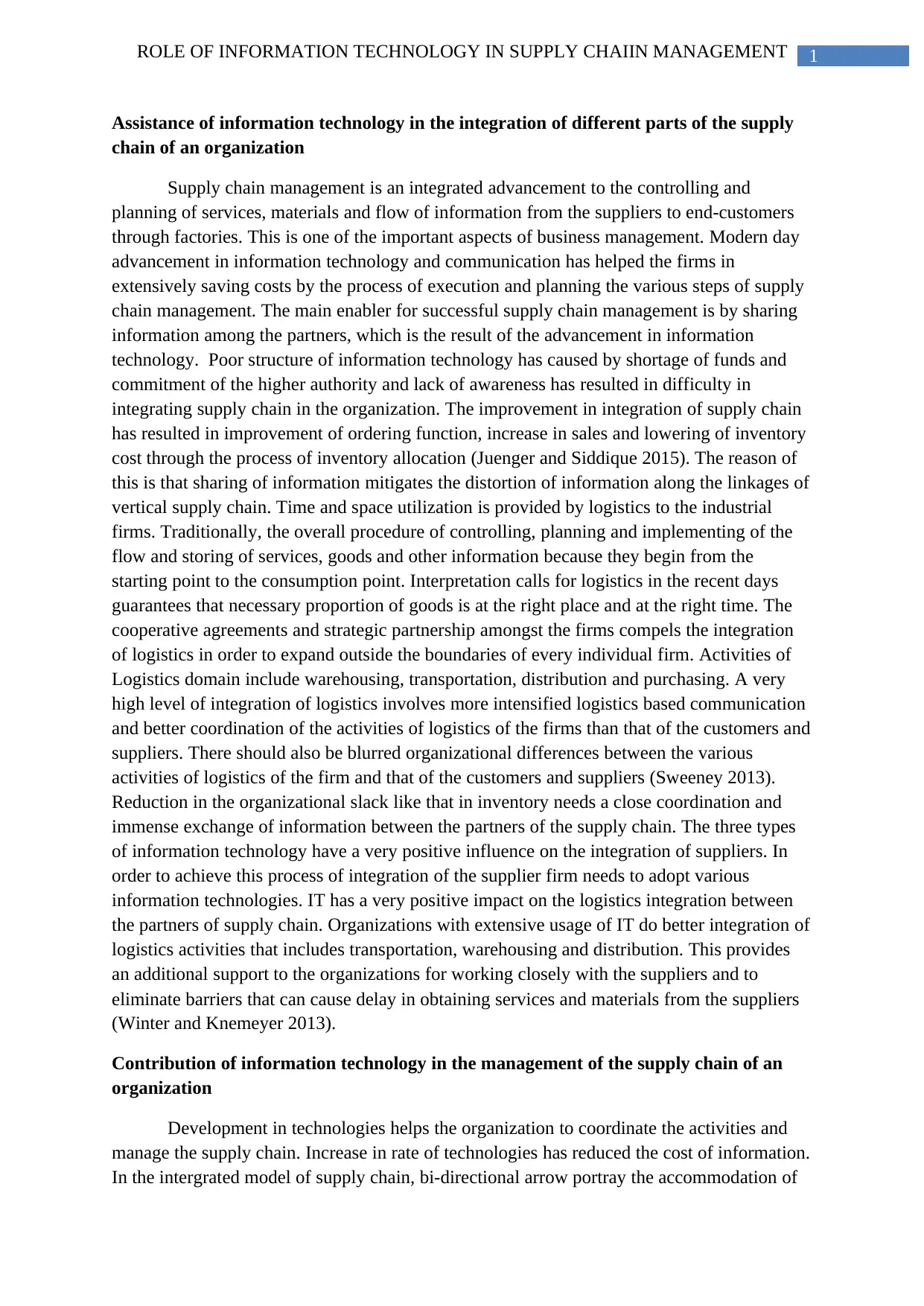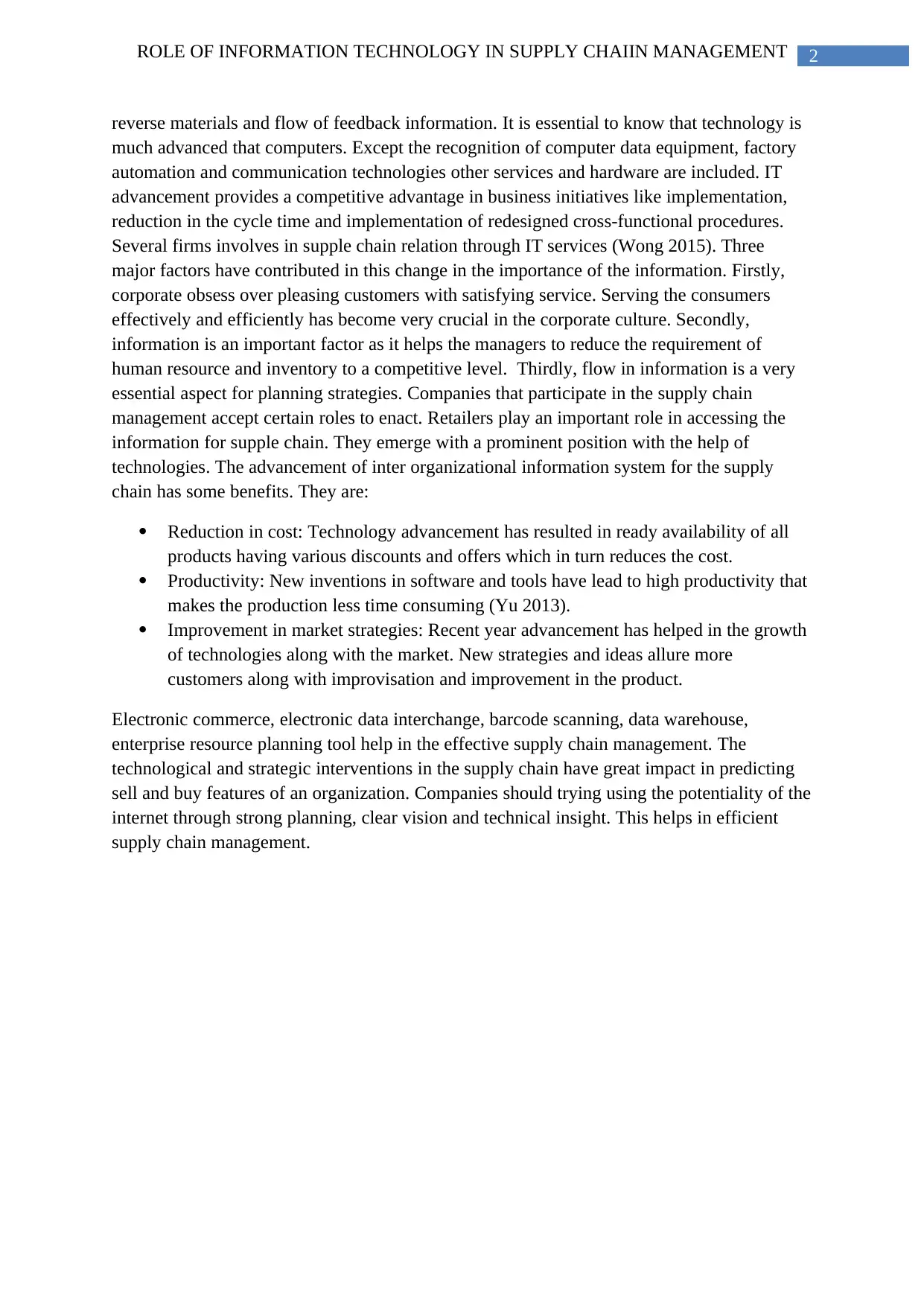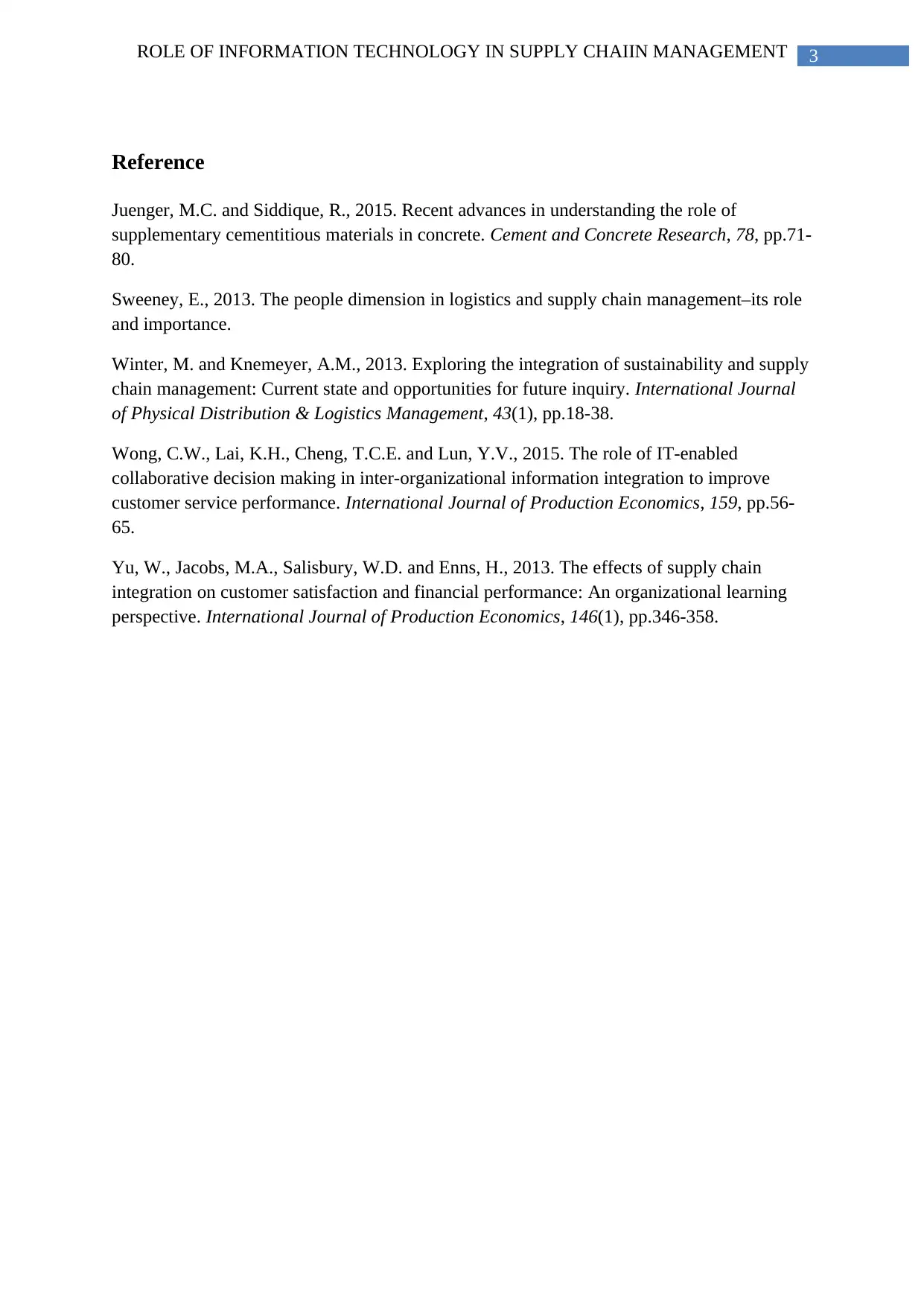Strategic Supply Chain Management: IT Role and Impact Analysis
VerifiedAdded on 2022/12/03
|4
|1180
|484
Report
AI Summary
This report delves into the pivotal role of information technology (IT) within supply chain management, emphasizing its transformative impact on various facets of business operations. The report highlights how IT facilitates cost reduction, enhances productivity, and improves market strategies through tools like electronic data interchange and enterprise resource planning. It examines the integration of logistics, warehousing, and distribution, underscoring the importance of information sharing among partners to mitigate information distortion and improve ordering functions. The study also addresses the contribution of IT in coordinating activities, managing supply chains, and providing a competitive edge in business initiatives, ultimately advocating for the utilization of the internet through strong planning and technical insight for efficient supply chain management. The report references several studies to support its findings, providing a comprehensive overview of the subject.

Running head: ROLE OF INFORMATION TECHNOLOGY IN SUPPLY CHAIIN
MANAGEMENT
Role of information technology in supply chain management
Name of the Student
Name of the University
Author Note
MANAGEMENT
Role of information technology in supply chain management
Name of the Student
Name of the University
Author Note
Paraphrase This Document
Need a fresh take? Get an instant paraphrase of this document with our AI Paraphraser

1ROLE OF INFORMATION TECHNOLOGY IN SUPPLY CHAIIN MANAGEMENT
Assistance of information technology in the integration of different parts of the supply
chain of an organization
Supply chain management is an integrated advancement to the controlling and
planning of services, materials and flow of information from the suppliers to end-customers
through factories. This is one of the important aspects of business management. Modern day
advancement in information technology and communication has helped the firms in
extensively saving costs by the process of execution and planning the various steps of supply
chain management. The main enabler for successful supply chain management is by sharing
information among the partners, which is the result of the advancement in information
technology. Poor structure of information technology has caused by shortage of funds and
commitment of the higher authority and lack of awareness has resulted in difficulty in
integrating supply chain in the organization. The improvement in integration of supply chain
has resulted in improvement of ordering function, increase in sales and lowering of inventory
cost through the process of inventory allocation (Juenger and Siddique 2015). The reason of
this is that sharing of information mitigates the distortion of information along the linkages of
vertical supply chain. Time and space utilization is provided by logistics to the industrial
firms. Traditionally, the overall procedure of controlling, planning and implementing of the
flow and storing of services, goods and other information because they begin from the
starting point to the consumption point. Interpretation calls for logistics in the recent days
guarantees that necessary proportion of goods is at the right place and at the right time. The
cooperative agreements and strategic partnership amongst the firms compels the integration
of logistics in order to expand outside the boundaries of every individual firm. Activities of
Logistics domain include warehousing, transportation, distribution and purchasing. A very
high level of integration of logistics involves more intensified logistics based communication
and better coordination of the activities of logistics of the firms than that of the customers and
suppliers. There should also be blurred organizational differences between the various
activities of logistics of the firm and that of the customers and suppliers (Sweeney 2013).
Reduction in the organizational slack like that in inventory needs a close coordination and
immense exchange of information between the partners of the supply chain. The three types
of information technology have a very positive influence on the integration of suppliers. In
order to achieve this process of integration of the supplier firm needs to adopt various
information technologies. IT has a very positive impact on the logistics integration between
the partners of supply chain. Organizations with extensive usage of IT do better integration of
logistics activities that includes transportation, warehousing and distribution. This provides
an additional support to the organizations for working closely with the suppliers and to
eliminate barriers that can cause delay in obtaining services and materials from the suppliers
(Winter and Knemeyer 2013).
Contribution of information technology in the management of the supply chain of an
organization
Development in technologies helps the organization to coordinate the activities and
manage the supply chain. Increase in rate of technologies has reduced the cost of information.
In the intergrated model of supply chain, bi-directional arrow portray the accommodation of
Assistance of information technology in the integration of different parts of the supply
chain of an organization
Supply chain management is an integrated advancement to the controlling and
planning of services, materials and flow of information from the suppliers to end-customers
through factories. This is one of the important aspects of business management. Modern day
advancement in information technology and communication has helped the firms in
extensively saving costs by the process of execution and planning the various steps of supply
chain management. The main enabler for successful supply chain management is by sharing
information among the partners, which is the result of the advancement in information
technology. Poor structure of information technology has caused by shortage of funds and
commitment of the higher authority and lack of awareness has resulted in difficulty in
integrating supply chain in the organization. The improvement in integration of supply chain
has resulted in improvement of ordering function, increase in sales and lowering of inventory
cost through the process of inventory allocation (Juenger and Siddique 2015). The reason of
this is that sharing of information mitigates the distortion of information along the linkages of
vertical supply chain. Time and space utilization is provided by logistics to the industrial
firms. Traditionally, the overall procedure of controlling, planning and implementing of the
flow and storing of services, goods and other information because they begin from the
starting point to the consumption point. Interpretation calls for logistics in the recent days
guarantees that necessary proportion of goods is at the right place and at the right time. The
cooperative agreements and strategic partnership amongst the firms compels the integration
of logistics in order to expand outside the boundaries of every individual firm. Activities of
Logistics domain include warehousing, transportation, distribution and purchasing. A very
high level of integration of logistics involves more intensified logistics based communication
and better coordination of the activities of logistics of the firms than that of the customers and
suppliers. There should also be blurred organizational differences between the various
activities of logistics of the firm and that of the customers and suppliers (Sweeney 2013).
Reduction in the organizational slack like that in inventory needs a close coordination and
immense exchange of information between the partners of the supply chain. The three types
of information technology have a very positive influence on the integration of suppliers. In
order to achieve this process of integration of the supplier firm needs to adopt various
information technologies. IT has a very positive impact on the logistics integration between
the partners of supply chain. Organizations with extensive usage of IT do better integration of
logistics activities that includes transportation, warehousing and distribution. This provides
an additional support to the organizations for working closely with the suppliers and to
eliminate barriers that can cause delay in obtaining services and materials from the suppliers
(Winter and Knemeyer 2013).
Contribution of information technology in the management of the supply chain of an
organization
Development in technologies helps the organization to coordinate the activities and
manage the supply chain. Increase in rate of technologies has reduced the cost of information.
In the intergrated model of supply chain, bi-directional arrow portray the accommodation of

2ROLE OF INFORMATION TECHNOLOGY IN SUPPLY CHAIIN MANAGEMENT
reverse materials and flow of feedback information. It is essential to know that technology is
much advanced that computers. Except the recognition of computer data equipment, factory
automation and communication technologies other services and hardware are included. IT
advancement provides a competitive advantage in business initiatives like implementation,
reduction in the cycle time and implementation of redesigned cross-functional procedures.
Several firms involves in supple chain relation through IT services (Wong 2015). Three
major factors have contributed in this change in the importance of the information. Firstly,
corporate obsess over pleasing customers with satisfying service. Serving the consumers
effectively and efficiently has become very crucial in the corporate culture. Secondly,
information is an important factor as it helps the managers to reduce the requirement of
human resource and inventory to a competitive level. Thirdly, flow in information is a very
essential aspect for planning strategies. Companies that participate in the supply chain
management accept certain roles to enact. Retailers play an important role in accessing the
information for supple chain. They emerge with a prominent position with the help of
technologies. The advancement of inter organizational information system for the supply
chain has some benefits. They are:
Reduction in cost: Technology advancement has resulted in ready availability of all
products having various discounts and offers which in turn reduces the cost.
Productivity: New inventions in software and tools have lead to high productivity that
makes the production less time consuming (Yu 2013).
Improvement in market strategies: Recent year advancement has helped in the growth
of technologies along with the market. New strategies and ideas allure more
customers along with improvisation and improvement in the product.
Electronic commerce, electronic data interchange, barcode scanning, data warehouse,
enterprise resource planning tool help in the effective supply chain management. The
technological and strategic interventions in the supply chain have great impact in predicting
sell and buy features of an organization. Companies should trying using the potentiality of the
internet through strong planning, clear vision and technical insight. This helps in efficient
supply chain management.
reverse materials and flow of feedback information. It is essential to know that technology is
much advanced that computers. Except the recognition of computer data equipment, factory
automation and communication technologies other services and hardware are included. IT
advancement provides a competitive advantage in business initiatives like implementation,
reduction in the cycle time and implementation of redesigned cross-functional procedures.
Several firms involves in supple chain relation through IT services (Wong 2015). Three
major factors have contributed in this change in the importance of the information. Firstly,
corporate obsess over pleasing customers with satisfying service. Serving the consumers
effectively and efficiently has become very crucial in the corporate culture. Secondly,
information is an important factor as it helps the managers to reduce the requirement of
human resource and inventory to a competitive level. Thirdly, flow in information is a very
essential aspect for planning strategies. Companies that participate in the supply chain
management accept certain roles to enact. Retailers play an important role in accessing the
information for supple chain. They emerge with a prominent position with the help of
technologies. The advancement of inter organizational information system for the supply
chain has some benefits. They are:
Reduction in cost: Technology advancement has resulted in ready availability of all
products having various discounts and offers which in turn reduces the cost.
Productivity: New inventions in software and tools have lead to high productivity that
makes the production less time consuming (Yu 2013).
Improvement in market strategies: Recent year advancement has helped in the growth
of technologies along with the market. New strategies and ideas allure more
customers along with improvisation and improvement in the product.
Electronic commerce, electronic data interchange, barcode scanning, data warehouse,
enterprise resource planning tool help in the effective supply chain management. The
technological and strategic interventions in the supply chain have great impact in predicting
sell and buy features of an organization. Companies should trying using the potentiality of the
internet through strong planning, clear vision and technical insight. This helps in efficient
supply chain management.
⊘ This is a preview!⊘
Do you want full access?
Subscribe today to unlock all pages.

Trusted by 1+ million students worldwide

3ROLE OF INFORMATION TECHNOLOGY IN SUPPLY CHAIIN MANAGEMENT
Reference
Juenger, M.C. and Siddique, R., 2015. Recent advances in understanding the role of
supplementary cementitious materials in concrete. Cement and Concrete Research, 78, pp.71-
80.
Sweeney, E., 2013. The people dimension in logistics and supply chain management–its role
and importance.
Winter, M. and Knemeyer, A.M., 2013. Exploring the integration of sustainability and supply
chain management: Current state and opportunities for future inquiry. International Journal
of Physical Distribution & Logistics Management, 43(1), pp.18-38.
Wong, C.W., Lai, K.H., Cheng, T.C.E. and Lun, Y.V., 2015. The role of IT-enabled
collaborative decision making in inter-organizational information integration to improve
customer service performance. International Journal of Production Economics, 159, pp.56-
65.
Yu, W., Jacobs, M.A., Salisbury, W.D. and Enns, H., 2013. The effects of supply chain
integration on customer satisfaction and financial performance: An organizational learning
perspective. International Journal of Production Economics, 146(1), pp.346-358.
Reference
Juenger, M.C. and Siddique, R., 2015. Recent advances in understanding the role of
supplementary cementitious materials in concrete. Cement and Concrete Research, 78, pp.71-
80.
Sweeney, E., 2013. The people dimension in logistics and supply chain management–its role
and importance.
Winter, M. and Knemeyer, A.M., 2013. Exploring the integration of sustainability and supply
chain management: Current state and opportunities for future inquiry. International Journal
of Physical Distribution & Logistics Management, 43(1), pp.18-38.
Wong, C.W., Lai, K.H., Cheng, T.C.E. and Lun, Y.V., 2015. The role of IT-enabled
collaborative decision making in inter-organizational information integration to improve
customer service performance. International Journal of Production Economics, 159, pp.56-
65.
Yu, W., Jacobs, M.A., Salisbury, W.D. and Enns, H., 2013. The effects of supply chain
integration on customer satisfaction and financial performance: An organizational learning
perspective. International Journal of Production Economics, 146(1), pp.346-358.
1 out of 4
Related Documents
Your All-in-One AI-Powered Toolkit for Academic Success.
+13062052269
info@desklib.com
Available 24*7 on WhatsApp / Email
![[object Object]](/_next/static/media/star-bottom.7253800d.svg)
Unlock your academic potential
Copyright © 2020–2026 A2Z Services. All Rights Reserved. Developed and managed by ZUCOL.





